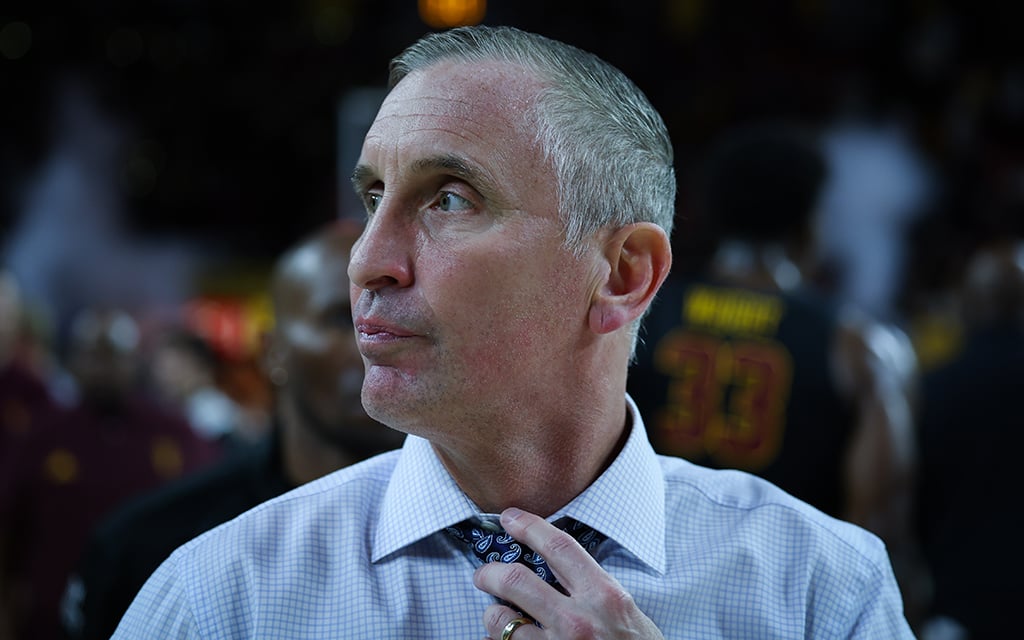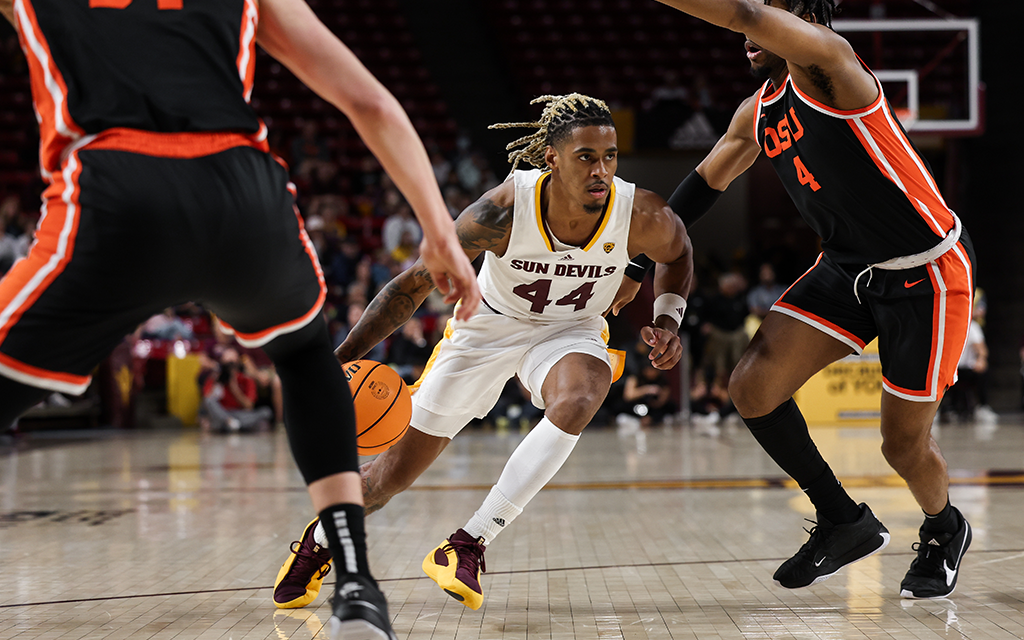PHOENIX – At his first Big 12 media day, Bobby Hurley talked about playing “Arizona State basketball.” Now entering his 10th season in charge of Sun Devils men’s basketball, an important question begs answering: What is Arizona State basketball?
When considering identities in the Big 12, coach Kelvin Sampson’s high-octane rebounding at Houston and Bill Self’s big-game prowess with the Kansas Jayhawks often come to mind. The answer to that question is not easy for Arizona State.
The Sun Devils have a 155-131 record under Hurley, a collegiate basketball legend and member of a truly dynastic basketball family. But those 155 wins produced just three NCAA Tournament appearances, zero trips to the round of 32 and zero conference championships in the Pac-12.
From a player identity standpoint, there hasn’t been one. Roster turnover hit ASU hard the last two seasons, with the 2024-2025 season being the second in a row with only two significant contributors from the previous season returning to play for Hurley. That is no indictment on Hurley’s coaching either, with over 1,000 players entering the transfer portal for college basketball in 2024.
A moment at Wednesday’s Big 12 Media Day in Kansas City perfectly encapsulated the constant change. Former ASU point guard Frankie Collins, a player who Hurley coached tirelessly to mold him into a more modern version of himself, worked through a horde of media to embrace his former mentor. Collins was one of Hurley’s success stories. Unfortunately for Hurley and ASU, the hug and casual chat took place while Collins brandished his new TCU basketball sweatsuit after transferring in the spring.
Got the moment Frankie Collins bumped into Bobby Hurley. No he doesn't look the same in purple.@SunDevilHoops pic.twitter.com/kazmHzjraT
— Michelle Gardner (@MGardnerSports) October 23, 2024
“We’re not in a good place right now … we have to get back to the drawing board,” Hurley said after Arizona State’s last Pac-12 game ever, a 90-57 drubbing in the first round of the Pac-12 Tournament last March.
It was as solemn as Hurley has been in the last two seasons. About seven months later, Hurley looked and sounded different.
“I said excited a lot, like four times I think,” he told reporters after his opening statement at Big 12 Media Day.
Hurley’s four uses of the word excited was acceptable, considering he secured one of the program’s best recruiting classes in history and a trio of exciting transfers. But creating a team identity that lasts is where the mystery remains.
The new era forced Hurley to change, admittedly.
“Head coaches now have to wear a number of hats, and I had to put my fundraising hat on,” he told ESPN’s Fran Fraschilla at Big 12 Media Day.
A coordinated effort to target NIL (name, image and likeness) donors over the spring and summer helped vault ASU’s recruiting capabilities to a new level, with ESPN listing Hurley’s new class at No. 6 in the nation. Under Ray Anderson, the Arizona State athletic program had significant problems adapting to the new world of NIL deals and the business of college athletics. With new athletic director Graham Rossini empowering ASU’s entire coaching roster with confidence and resources, the changes are easy to see.
“We needed to upgrade and improve our NIL program and I’ve gotten great support from the university and our donors to make that a reality and we’ve been able to go out and attract guys in the portal and put together a top recruiting class,” Hurley told Fraschilla.
Maybe the question has changed. It’s no longer about ASU’s ability to develop an identity, but rather if any team can establish one in the ever-changing landscape of collegiate athletics.
Perhaps that works in Hurley’s favor. With ASU’s significant changes over the last three seasons, few programs are more accustomed to it.
Hurley is aware of the challenges that he faces with such a new roster going into the Big 12. Rather than be a copycat of the top programs of the conference, Hurley decided to preach patience, something fans might not be as receptive to as he would like.
“I don’t want to try to be better than some of the top programs that have been great rebounding programs or that have been tremendous defensive programs. I’m not sure that in a few months we can become a better rebounding team than Houston,” Hurley told reporters Wednesday.
The one thing Hurley’s Arizona State teams consistently do is create chaos. An emphasis on athleticism was a staple of the roster the last two seasons, and it allowed the Sun Devils to have tremendous success defensively in the 2022-2023 season, in which they made the NCAA Tournament. That athleticism enabled Hurley to deploy frenetic defensive looks early and often. His schemes don’t always work or look aesthetically pleasing, but when executed well, they work for the Sun Devils.
“I think our calling card has to be playing with pace, using the three-point line as a weapon,” Hurley told reporters on Thursday. “If we could do those things, then we’ll be a little bit different … we’re more of a team that should be free-flowing and that is more skilled on the offensive end.”
The current vision Hurley wants to make a reality is likely one where his team emulates his style as a player at Duke. He was an undersized guard who made up for his lack of flash and size with quickness, aggressiveness and an unrivaled work rate during his time.
Hurley’s pedigree and chaos don’t mix perfectly, but a marriage of the two to form organized chaos in his first season as part of the Big 12 Conference could help the Sun Devils finish higher than a 12th-place prediction in the preseason poll. That’s not a surprise to a team that had a 14-18 season in the Pac-12 before a transition to the Big 12.
“We’re looking to regroup. We’re excited about our first season in the Big 12,” Hurley said. “It’s, in my opinion, the best basketball league in the country.”
Arizona State basketball really is Bobby Hurley. The Sun Devils will be defined by what he can manufacture on the court in his first few seasons playing in the Big 12. There is no legendary coach’s name hanging in the rafters of Desert Financial Arena. The memories of Herb Sendek’s up-and-down tenure have blown away in the sands of the desert.
It’s clear that the school placed its faith in Hurley and provided him the support he needed to finally chart a clearer path for the program. Now the challenge is defining that path. With a trip to Duke for an exhibition game coming on Sunday, Hurley laid out the next step for his Sun Devils on Thursday.
“We got to put our foot on the gas pedal and get going.”



